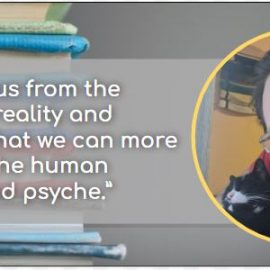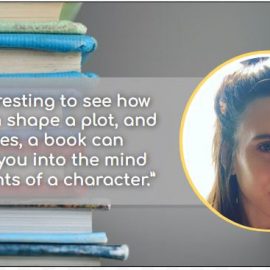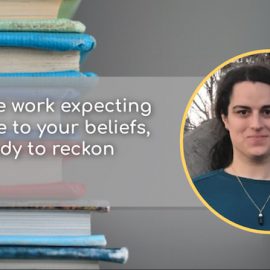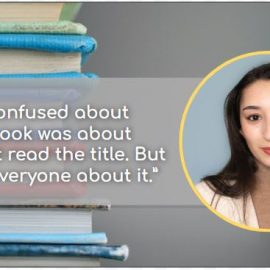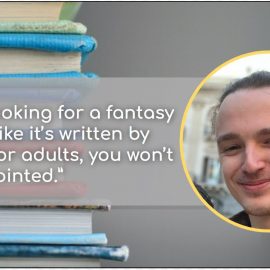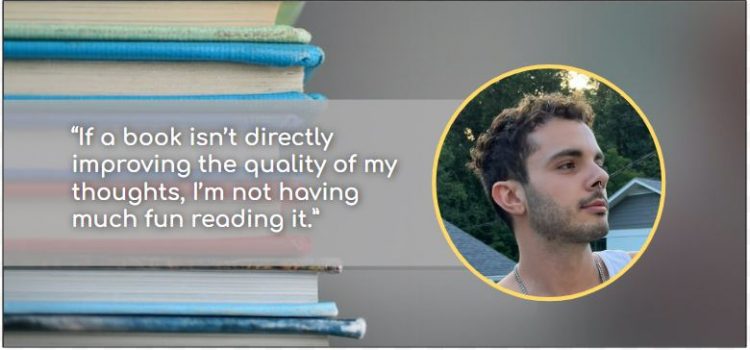
What book caused Vincent to wager $1,000? What book can teach you the real importance of forgiveness?
Vincent is a Shortform book guide writer from North Carolina. We interviewed him recently to learn about his tastes and how books have impacted his life.
Our Interview With Vincent
Vincent prefers to read books that help him learn and grow as an individual and is a strong believer in the power of a well-researched self-help book. Here’s our interview with him.
What’s your favorite book?
My favorite book is The 48 Laws of Power by Robert Greene. I love how the book states so many things that are on everyone’s mind but that most people are afraid to say. While I think it presents a dismal view of human nature, I believe this book has a lot to teach about human vanity and how to become more powerful yourself.
Wielding power is a necessary part of human life. What matters is what you choose to do with it. I think Dumbledore from Harry Potter is a perfect example of this. Dumbledore, so thoughtful, gentle, and trusting, had his dark side and his grandiosity. His ability to lead others, read people, compete against enemies, and sway public opinion were all necessary for helping to defeat Voldemort. The 48 Laws of Power is a beautifully written book, and, when read with good intentions, a tool for good.
What’s on your reading list these days?
The most recent book I’ve read—or rather listened to—is The Obstacle Is the Way by Ryan Holiday. I’ve found it extremely helpful for reframing otherwise unpleasant situations and being able to accept things as they are.
I’m currently reading Models: Attract Women Through Honesty by Mark Manson. I’m finding it healing and therapeutic to realize that having rough edges and not being perfect makes you more attractive and socially magnetic to people, not less.
I’ll likely read The Gift of Therapy by Irvin Yalom next to help me prepare for my eventual career goal of becoming a therapist or counselor.
If you could have a dinner party with any three authors—dead or alive—who would they be and why?
Robert Greene, Glennon Doyle, and maybe Alan Watts or Aldous Huxley. Maybe Neill Strauss—thanks to his book The Truth, not The Game. Maybe Albert Hoffman or Alexander Shulgin. Maybe Jordan Peterson. Mostly just Glennon Doyle though. When I’m at my happiest, I think of her and how thankful I am that it’s safe to have faith in everything and in yourself.
What’s your favorite genre? Why does it intrigue you?
My favorite genres are psychology and self-help. When I read, I want to change the way I think about the world in ways that empower me to be a better, stronger person. If a book isn’t directly improving the quality of my thoughts, I’m not having much fun reading it.
Are there any book genres or tropes that you dislike or refuse to read?
I dislike most self-help that’s not written at least a little bit academically. I think the ideas get watered down and become less useful to me, and the ideas are usually presented in a more disorganized way. Brené Brown is a good example of an author I don’t love. That said, I am a huge fan of Glennon Doyle.
What’s your favorite way to read a book?
I love physical copies. Something about them. They’re special.
But audiobooks are awesome, too, because I get to listen to them while I do other things. They help me “read” twice as much as I otherwise would.
What books do you think everyone should read in their lifetime?
Untamed by Glennon Doyle. It’s an utterly beautiful book on the power of taking the leap of faith that comes with just accepting, on principle, that you are worthy and that you can trust your own feelings—rather than having to avoid them or hide them from others. I think it teaches us to be intimate with ourselves and others. And I believe in the Jungian idea that integrating and accepting our whole selves is the entire point of living.
Who are your favorite authors?
Robert Greene. His written voice comes across as epic and authoritative. He knows how to use language to appeal to your emotions and seduce you into accepting his ideas. Reading his work is otherworldly to me.
Glennon Doyle. She has the most wholesome tone in her writing. Nobody’s words feel so kind or so inviting as hers. She makes me want to embrace love.
How have your reading tastes changed over the years?
I used to be interested in reading books that were less applicable to my life. I would read various fiction books and a bit of philosophy just for the sake of learning and becoming more cultured. Now, I read to help me take on my current challenges in the day-to-day. It’s therapeutic for me and a large part of how I process and heal from old wounds.
Was there a specific book that sparked your love of reading? How so?
Harry Potter and the Sorcerer’s Stone. I read it as a kid and didn’t enjoy it much, and then I watched the first two movies before taking a huge hiatus. Then, at age 19, I picked the book up again on a camping trip. I immediately fell in love with the world-building and the whimsical, playful reality of life at Hogwarts. I read through The Goblet of Fire before taking another Harry Potter hiatus for several years to focus on reading other things. I finally finished books 5 to 7 this last year at age 25. It was a really cool experience getting to read the whole series as an adult and without having seen the movies first.
Do you have any guilty pleasure books?
12 Rules for Life and Beyond Order by Jordan Peterson. While I find some of his views completely noxious, I love his psychology and philosophy. He’s often considered a pseudo-intellectual, but I can’t comprehend how. I’ve never come across a more comprehensive philosophy of life than his. His ideas have shaped the way I understand life, the mind, the world, and spirituality more than any other single individual.
What’s an interesting fact that you learned from a book recently?
In The Truth by Neil Strauss, I learned the importance of forgiveness. I’d heard about a billion times that forgiving those who harmed you is crucial for healing yourself, but I couldn’t figure out why. I’m not sure if this book explicitly states the answer, or if it just nudged me in the right direction to discover the answer for myself.
When we refuse to forgive somebody and hold resentment towards them, our internal narrative is that they caused us harm. This reinforces the idea that we have been harmed and are a victim of that harm. But thinking of ourselves this way makes the harm worse. If you can let go of the fact that you were harmed and stop thinking of yourself as a victim, you can move past the pain of being treated poorly and become less affected by it. We forgive others to help ourselves let go of the past and feel empowered to grow rather than victimized and stuck.
Have any books you’ve read caused you to make any life changes or to develop any habits?
Personality Isn’t Permanent by Benjamin Hardy inspired me to set an extremely ambitious three-month goal for myself, and I put $1,000 on the line that I lose if I fail.
Also, Wired to Create by Scott Barry Kaufman taught me how to use my “right brain,”—I know this is a gross oversimplification, but it works—how to understand fiction more deeply, as well as how to use intuition rather than just being constantly logical.
What’s your favorite quote from a book or an author?
Not my favorite, but I do love “And if you think tough men are dangerous, wait until you see what weak men are capable of.“ (Jordan Peterson, 12 Rules for Life)
What are your favorite book adaptations?
I’m Thinking of Ending Things was really awesome. It’s like a deep dive into subconscious shame and fear. The book wasn’t half as good as the movie. I have no clue what’s going on in the plot, but the way it makes me feel is breathtaking. Like, Charlie Kaufman knows every single subconscious fear or shame that I have and puts it on a screen to show me what it would be like to be plunged right into it all.
Also, the How to Change Your Mind docuseries on Netflix is awesome. I think it came at an extremely valuable time, as psychedelic-assisted therapies are on the brink of legalization. My hope is that this series and the awareness it spreads lead to legislative change that can help individuals suffering from serious mental illness—or just the everyday existential problems of being human—get the help they need.
Are there any lesser-known books that you’ve read that you want others to know exist?
Wired to Create by Scott Barry Kaufman. He’s a psychologist who’s done a bunch of research on creativity—and I think he’s collaborated with Jordan Peterson on some studies and is also a friend of Robert Greene’s. The book is about the psychology of the default mode network and the way that more imaginative, creative, intuitive, and emotional types of thinking works. It completely changed the way I see reality.
While I’d previously been extremely, rigidly analytical, I learned how to also think more intuitively and to feel rather than just analyze. This has helped me truly understand art for the first time in my life, and has been indispensable for helping me develop emotional intelligence and maturity. It’s also been extremely helpful for healing from anxiety and the need for a feeling of certainty.
At Shortform, how do you go about working on a book that has viewpoints you don’t agree with?
I’ve yet to do this, but I imagine this would be fairly easy for me. I’m great at setting aside my emotions and engaging analytically with ideas. I would steelman the author’s book while also adding balanced commentary that sometimes undermines some of the book’s ideas, just as I would with any other book.
Are there any books you had to read for Shortform that you thought you wouldn’t like and ended up loving?
I read Personality Isn’t Permanent by Benjamin Hardy. He’s a psychologist, but it’s a pretty basic self-help book that’s not very academic. I was expecting it to be trite, but I was blown away. I felt truly inspired and have since made some monumental life changes based on reading this book.
What are your favorite books in the Shortform library?
In addition to the ones I’ve already mentioned, I’d choose: Four Thousand Weeks: Time Management for Mortals, Mastery, and No More Mr. Nice Guy.
Vincent’s Recommended Reading List
- The 48 Laws of Power by Robert Greene
- Untamed by Glennon Doyle
- Wired to Create by Scott Barry Kaufman
- Personality Isn’t Permanent by Benjamin Hardy
About the Series
At Shortform, we want to give our employees names and faces so you can get to know the people who make the magic happen. That’s why we’re doing the Shortform Reads series, where we interview our employees and share their thoughts and opinions. You can check out more employee interviews here.

